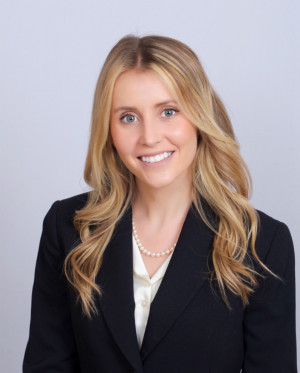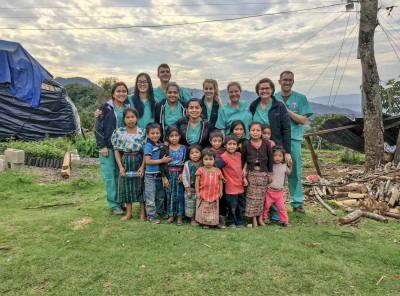
Making a Difference by Leading with Heart
by ACOI
April 16, 2025

Dr. Schroeder first became involved with ACOI after being accepted into an internal medicine program. “Most of my residency class are DO physicians, so that’s where I heard about ACOI,” she said. After learning about how ACOI advocates for the DO profession, she joined, wanting to support those legislative efforts. Receiving the Susser award at the annual convention unlocked even more ways to engage with ACOI.
“After the ACOI [2024],” she said, “I’d had such a great time and was super inspired by all of the speakers, and some of the physicians that I met at the various talks and side groups – specifically, the women in medicine group. I really wanted to be more involved since I was so inspired by everyone there.”
Dr. Schroeder counts among her areas of interest women’s cardiovascular health, global health, health equity, and women’s representation in osteopathic medicine, so it's not surprising that she’d be drawn to this committee. What sets her apart is the personal background that piqued her interest in this subject, as well as in medicine in general.
A Deeply Personal Sense of Purpose
Dr. Schroeder is from Boise, Idaho – a state that, she noted, CDC ranked in 2019 as 50 out of 50 for the number of doctors per capita. She saw the effect of this while growing up: her family owns a small farm in a rural part of Idaho, where she spent summers with her grandparents and getting to know the local community. That was where that lack of accessible care made a deeply personal mark.
“My grandfather became seriously ill but faced delays in getting the care he needed.” The experience, though painful, reflected a broader issue in her community. “Preventative care is more of a luxury than an option.”
That was, in large part, what pointed Dr. Schroeder toward internal medicine: that it can provide primary care to communities. The experience also drew her toward cardiology, given the nature of her grandfather’s issues with cardiac care: “Strikingly,” she noted, in 2023, “Idaho was also ranked 50 out of 50 for cardiologists per capita.”
Since then, Dr. Schroeder has not deviated from the sense of purpose her upbringing gave her: “I have always known I've wanted to give back to my community,” she said, “and this was the way I wanted to do it.”
Initially, she received a Master of Public Health from the UC-Davis School of Medicine, to acquire a broader perspective before going into individualized patient care. She found that public health offered effective ways of addressing populational health as well as the importance of preventative health. It made a noticeable difference in her journey as a medical student at the Idaho College of Osteopathic Medicine and continues to do so during her residency. “Now, in the hospital working with individual patients, I know some of the barriers they go through,” she said. “Not just with obtaining insurance, but also other socioeconomic barriers – all these things that impact individual and community health.”
Serving Each Patient to Support Entire Communities
Dr. Schroeder is in her first year of residency at Arrowhead Regional Medical Center. The experience, she said, has given her so much valuable insight, and laid a strong foundation for pursuing her future goals.
“It’s truly every single day I learn something,” she said. “One component I didn’t realize, as a medical student who wasn’t the primary point of contact for patients, is the idea that when these patients come into the hospital, yes, that significantly impacts their health and their life. But then, that 60-year-old male patient is a dad or brother to someone [too]. So, his health being affected doesn’t just impact the patient, but also that whole community and family [that he’s part of]. I really like how internal medicine gives you the ability to talk to the patients and their families every day. You get the stories of their communities and how they make a difference when they get better and go back out into the world. To see the impact and how special that is – I never saw this glimpse before.”
This deeply humanizing effect has strengthened her resolve to continue to pursue medical healthcare availability for all and making sure people from all backgrounds have access to care. “Not everyone has the ability to see a clinic or physician or hospital that’s a couple minutes’ drive away,” she said; she is passionate about, as she puts it, “advocating for inclusive policies and pushing for systemic changes, and making medical education more accessible for historically marginalized groups.” Living this out has included volunteering at Genesis Community Clinic, an Idaho-based free clinic, during medical school (which ultimately earned her the American Association of Colleges of Osteopathic Medicine’s “Gold Award"), and working alongside fellow medical students to advocate for patients’ needs in the Idaho state legislature.
Another passion Dr. Schroeder intends to continue pursuing is women’s cardiovascular health. She went into residency with the goal of applying for a cardiology fellowship and is currently preparing for the application process. In the meantime, Dr. Schroeder has worked to make it more widely known how cardiac concerns show up differently in women. “I’ve done ‘heart talks,’” she said, “which are basically educational talks that tell women the differences in how heart attacks present in women. Because a lot of times, women are overlooked. It’s about bringing that to light with the patient population, so they can be advocates for themselves and receive that specialized care.”
When asked what she wished more women knew about this subject, she emphasized that getting regular blood pressure checks is a big one, hypertension being a number one silent killer. Beyond that, “Be a true advocate for yourself. You know your body best, and if you think something’s wrong, get a second opinion. Don’t be afraid to be big [about it].”
Following Passion and Finding Your “Why”

Dr. Schroeder’s interest in advocating for underrepresented populations is certainly definitive in her career. It even extends to an international focus: she’s also drawn to global health and health equity. A medical mission to Guatemala piqued this interest – it was the kind of experience that, she said, “opens your eyes and sheds light on the lack of medical services in rural areas.” The scarcity of resources where she served was stark; many of the patients the team treated had to walk for up to 12 hours to receive care. It was another formative event in line with her sense of purpose: “Hopefully,” she said, “I'd love to continue my global health work, even with something like Doctors Without Borders.”
It’s clear that, for Dr. Schroeder, leading through service and giving back is a way of life. When asked about how others could do the same in their own ways, her words of advice were straightforward: “Follow your heart and follow your ‘why.’ That’s what has really helped me. If I just stick to my heart and what I've always felt to be there, that's always positively guided me in the right direction.”

